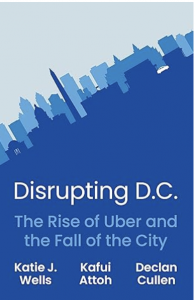Uber arouses strong opinions, for some good reasons. The trouble is – for those who strongly dislike the company’s treatment of its drivers – that it offers a service users and even some drivers seem to like a lot. That tension is at the core of Disrupting DC: The Rise of Uber and the Fall of the CIty by Katie Wells, Kafui Attoh and Declan Cullen. While the authors are clearly Uber critics, they acknowledge that the interviews on which the book is partly based reveal both sides of the coin. The account it contains of how Uber interacted with policymakers in DC is interesting too, playing into the city administration’s desire to embrace innovation.
However, the key point, is that Uber’s opportunities stem from cities’ failures. I can remember the shock I experienced trying to take taxis even in central DC or to and from the airport back in the 1980s, when it seemed more like a developing country. In many cities Uber has prompted other tax companies to improve their service. Of course Uber – like many fintechs – is taking advantage of opportunities for regulatory arbitrage (and some regulation is good and necessary, other regulations not so much) but also of the failure of cities to provide other infrastructure. Its opportunity to claim to provide a less biased and more responsive means of public transport depends on the absence of good public transport.
The chapters are written by different authors so it’s a slightly disjointed read. I found the chapter on data interesting given my own work in this area – it beats me why regulators don’t require data access when they do any deals with private companies. But all round, worth a read as an interesting and nuanced Uber case study.
